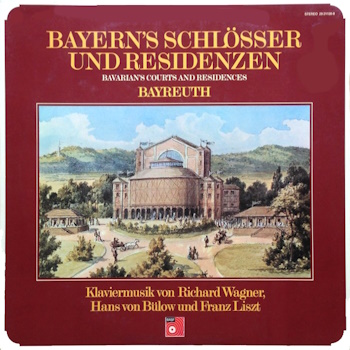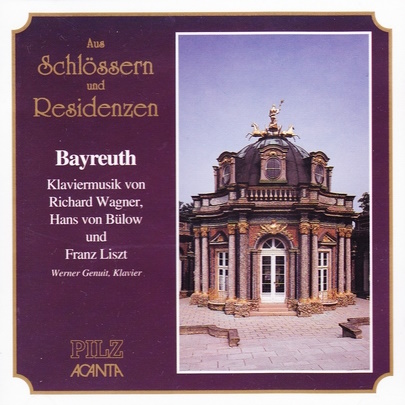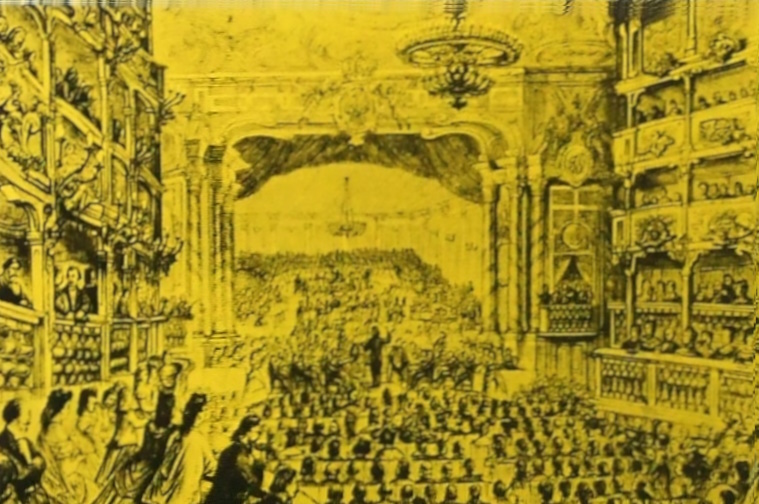 |
|
2 LPs
- 29 21108-8 - (p) 1972
|
 |
| 2 CDs -
44 2181-2 - (c) 1993 |
|
BAYREUTH
|
|
|
|
|
|
|
|
| Richard
WAGNER (1813-1883) |
Große
Sonate für Klavier |
LP 1 |
|
24' 07" |
|
|
-
Allegro con moto
|
|
6' 55" |
|
A1 |
|
-
Adagio Molto, e assai espressivo
|
|
8' 50" |
|
A2 |
|
-
Maestoso · Allegro molto |
|
8' 22" |
|
A3 |
| Richard WAGNER |
Fantasia
fis-moll für Klavier
(nachgelassenes Werk)
|
LP 1 |
|
24' 35" |
B
|
| Hans von BÜLOW
(1830-1894) |
Ballade,
Op. 11
|
LP 2 |
|
11' 32" |
C1 |
| Richard WAGNER
|
Eine
Sonate für das Album von Frau M.
W.
|
LP 2 |
|
10' 55" |
C2 |
| Richard WAGNER |
Ein
Albumblatt "Züricher Vielliebchen"
- Walzer
|
LP 2 |
|
1' 05" |
D1 |
| Richard WAGNER
|
In
das Album der Fürstin M.
|
LP 2 |
|
2' 35" |
D2 |
| Richard WAGNER
|
Albumblatt
für Frau Betty Schott |
LP 2 |
|
4' 23" |
D3 |
| Franz LISZT
(1811-1886) |
Richard Wagner -
Venezia |
LP 2 |
|
2' 48" |
D4 |
| Franz LISZT |
Trauergondel
I (La lugubre gondola I) |
LP 2 |
|
3' 53" |
D5
|
| Franz LISZT
|
Csárdás
macabre
|
LP 2 |
|
7' 00" |
D6 |
| Franz LISZT |
Nuages
gris
|
LP 2 |
|
2' 25" |
D7 |
|
|
|
|
| Werner GENUIT, Flügel
(Bösendorfer) |
|
|
|
|
Recorded
at: |
|
-
|
|
|
Live / Studio
|
|
Studio |
|
|
Producer |
|
-
|
|
|
Balance engineer
|
|
-
|
|
|
First LP Edition
|
|
BASF
| 29 21108-8 | 2 LPs | durata
48' 42" - 46' 36" | (p)
1972
|
|
|
First CD Edition |
|
PILZ
- ACANTA | 44 2181-2 | 2 CDs |
durata 48' 42" - 46' 36" | (c)
1993 | ADD
|
|
|
Note |
|
-
|
|
|
|
|
 Bayreuth
lies in a magnificent setting
and is full of palatial houses,"
wrote Robert Schumann in the
year 1828. He was visiting
Nayreuth not for musical but for
literaly reasons, the attraction
being the literaly idol of his
youth, Jean Paul, who lived
there from 1804 until his death
in 1825. It wasin Bayreuth where
Jean Paul wrote these
much-quoted lines often applied
to Wagner: "...So far the Sun
God has bestowed the gift of
poetry with his right hand and
the gift of music with his left,
to mortals so far apart from
each other that we have had to
wait up until this moment for
the man who could both write and
compose a true opera." Jean Paul
was referring to the writer and
composer E. T. A. Hoffmann then
living in nearby Bamberg, and
there can be no question
whatsoever of his having
Wagner's music-dramas in mind.
It does seem a strange
coincidence, however, that he
should have written these words
in the very year of Wagner's
birth (1813), and in Bayreuth,
the very town in which the union
of writer and composer in one
person was to materialize and
where the result of this union,
the music-drama as such, was to
find its home. Bayreuth
lies in a magnificent setting
and is full of palatial houses,"
wrote Robert Schumann in the
year 1828. He was visiting
Nayreuth not for musical but for
literaly reasons, the attraction
being the literaly idol of his
youth, Jean Paul, who lived
there from 1804 until his death
in 1825. It wasin Bayreuth where
Jean Paul wrote these
much-quoted lines often applied
to Wagner: "...So far the Sun
God has bestowed the gift of
poetry with his right hand and
the gift of music with his left,
to mortals so far apart from
each other that we have had to
wait up until this moment for
the man who could both write and
compose a true opera." Jean Paul
was referring to the writer and
composer E. T. A. Hoffmann then
living in nearby Bamberg, and
there can be no question
whatsoever of his having
Wagner's music-dramas in mind.
It does seem a strange
coincidence, however, that he
should have written these words
in the very year of Wagner's
birth (1813), and in Bayreuth,
the very town in which the union
of writer and composer in one
person was to materialize and
where the result of this union,
the music-drama as such, was to
find its home.
Richard Wagner's first visit to
Bayreuth was in 1835. Writing
about it later he said, "The
journey through Eger over the
pinecovered Fichtel Mountains
and arriving in Bayreuth, which
was gently bathed in the evening
sunlight, long remained one of
my pleasantest memories."
Possibly this first favourable
impression had something to do
with thechoice of Bayreuth as a
place for his festival.
1871 proved a decisive year for
Bayreuth. In his search for a
suitable place for his festival
Wagner struck on Bayreuth with
its 18th century baronial
opera-house. After a visit in
April 1871, while realising that
the old building was inadequate
for his purposes, Wagner was so
taken with the place that he
announced the first Bayreuth
Festival of 1873 the following
month. In November 1871, after
he had informed the Bayreuth
banker and official
representative of the local
government, Friedrich Feustel,
that he intended to build his
festival theatre in Bayreuth,
they went out of their way to be
accommodating. As early as the
15th of December, Wagnber was
able to view a proposed site. It
seems that the City Fathers had
immediately realised what a big
attraction this internationally
famous composer and his proposed
festival would be, and what
economic bvenefits it would
bring to this rather remote
little town in Franconia. When
it turned out that building on
the suggested site presented
insurmountable difficulties, a
new site was immediately sought,
and on January 8th, 1872, the
Mayor, Theodor Muncker, in
person, undertook the journey to
Lucerne, Wagner's residence at
the time, to obtain the
composer's consent to the new
location of the theatre. On
January 31st Wagner was again in
Bayreuth, where, on February 1st
the "Administrative Council of
the Bayreuth Festival" was
formed. At the end of April
Wagner moved to Bayreuth with
his family and the children of
his wife by her marriage with
Hans von Bülow. On May 22nd, his
59th birthday, Wagner laid the
foundation-stone of the theatre.
To mark the occasion he
conducted a performance of
Beethoven's Ninth Symphony in
the old opera house. In this way
Wagner wished Beethoven's last
symphony with its transition to
the sung word to symbolise the
foundation-stone of his own
work, the music-drama.
In 1876 the first Bayreuth
Festival took place and the
"Nibelung's Ring" was given its
first performance. Leading
artists took part, Ludwig II,
Emperor Wilhelm I, and Don
Pedros II of Brazil were in the
audience. Franz Liszt, Peter
Tchaikovsky, Friedrich Nietzsche
and other eminent persons
attended either rehearsals or
performances. Bayreuth was
scarcely able to cope with this
onslaught. Many had to put up
with makeshift lodgings, and the
catering was far removed from
present-day standards.
Nevertheless, the first festival
ended with a deficit, and Wagner
was compelled to organize
concert tours to make up some of
his losses. To repeat the
festival was, for the time
being, out of the question. Not
until 1882 was it possible to
put on performances again at the
Festival Theatre. The
sacred-music-drama "Parsifal"
received its first stage
performance. On the last evening
Wagner himself was suddenly
moved to take over the
conducting. It was the only time
he had ever conducted at the
Festival Theatre.
In 1874 Wagner took up residence
in his new villa "Wahnfried" (in
the present-day Richard Wagner
Strasse), which had been
especially built according to
his own specifications. "Villa
Wahnfried" was to become
thecentre of musical life in
Bayreuth far more than the
actual Festival Theatre. It was
in this house that all the
preliminary studies for the
"Ring" were gone through. There
was hardly a day there without
some sort of music-making.
Wagner himself, although
possessing only slight pianistic
ability, used to play anything
from Bach's 48 Preludes and
Fuges to Liszt's Symphonic Poems
and his own music-drama. If
there were other pianists
present, they, of course, had to
play. Joseph Rubinstein,
Wagner's "house pianist", was
permanently in demand. Hans
Richter, the conductor of the
"Ring", and Felix Mottl, later
to conduct the Bayreuth
"Tristan", were also frequently
to be found seated at the piano.
Highlights of the year were
always the days when Franz Liszt
came to stay at Villa Wahnfried.
Wagner regarded him the greatest
pianist of the age, extolling
his performances of Beethoven.
Frequently Liszt would play his
own compositions. After Wagner's
death in 1883 Liszt remained a
faithful visitor to the Festival
and it was during the 1886
Festival that he died, in a
house adjacent to Villa
Wahnfried.
Wagner also spent many
interesting hours at "Wahnfried"
searching out the early
compositions of his youth -
among which there were several
large-scale piano works- and
bringing them once more to
light. In this connection
Cosima, Wagner's wife, showed
particular initiative. On the
occasion of Wagner's 60th
birthday she arranged a "gala
evening" at the old baronial
opera-house, at which the
completely unsuspecting guest of
honour was treated to several of
his own early compositions. It
is said that he had hreat
difficulty in trying to name the
composer!
Whereas after Wagner's death the
Festival became a permanent
institution and made Bayreuth
famous throughout the world, the
importance of Villa Wahnfried as
a centre for intimate gatherings
of great musicians of the day
gradually waned. Villa Wahnfried
is now merely a museum and
archive.
Dr. Egon Voss
|
|